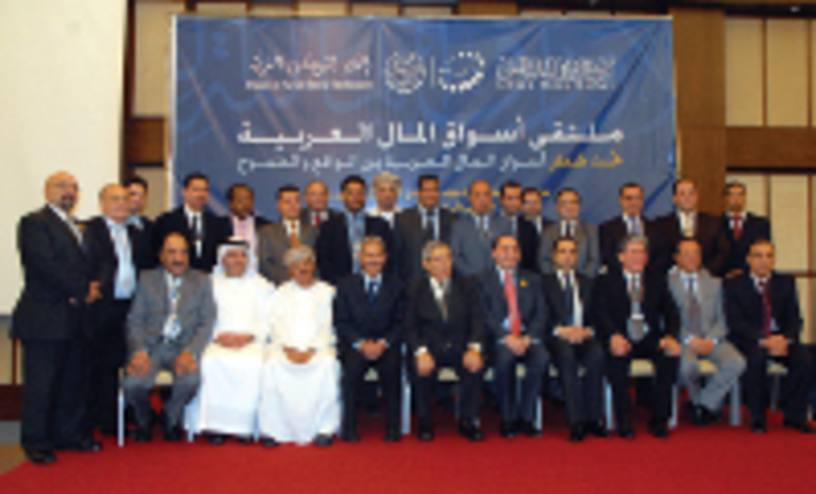"Libya's economy is strong, with no domestic debt, a budget surplus and lots of opportunities for investment," says Suliman Salaem Al Shahomy, chairman of the Libyan stock market. And Libya is quickly expanding its financial infrastructure to make investing through its infant stock exchange easier for both locals and foreigners.
The Libyan Stock Market (LSM) was established in 2008 with the main operations in the country's capital, Tripoli, and a branch in Benghazi, and Mr Al Shahomy is keen to make the exchange a key part of the country's economic reforms. The number of listed companies it houses has risen to 10 and, with new laws that would enhance the role of the private sector and a booming economy, the chairman expects this number to grow to 14 by the end of 2010.
The Libyan Stock Market board currently comprises five banks (Gumhouria Bank, Wahda Bank, Sahara Bank, Bank of Commerce and Development and Al-Saraya Bank), three insurance companies, one cement business and the stock exchange itself, making 10 in total. Mr Al Shahomy expects National Commercial Bank to be listed in July, following its initial public offering (IPO), which would bring the total to 11.
Taking stock
Mr Al Shahomy is well aware that the LSM still has a long way to go, but clear progress has been made and he expects the Stock Market Law, passed in May this year, to act as catalyst for more exchange activity and developments. The new law, according to Mr Al Shahomy, establishes a clear regulatory structure for the stock market along with new regulations for mutual funds. He says: "With the Stock Market Law, our stock market will be more active in the years ahead. Libya has a huge programme for developing its infrastructure and we will establish a lot of companies providing good opportunities to invest in these companies through the stock exchange."
Mr Al Shahomy also notes that the new law provides the infrastructure for the establishment of much-needed mutual funds, which he believes are very important for allowing the stock exchange to grow, as well as protecting small investors.
Another key development is the expected issuance of new banking licences, which will play a role in providing Libya with international-standard global custodian services. The new banks will be able to provide custodian services for foreign investors that have been lacking in the past. It is expected that the new foreign banks will manage the foreign business that the LSM is keen to encourage. Foreign ownership has been possible to a limited degree in the past through residency, but the new law and the availability of custody services will enable foreigners to buy and sell on the exchange much more easily.
Mr Shahomy says: "Investors prefer stock exchange investing - to go in and out - and we at the LSM want this here. Libya is a booming and safe place to invest, although we need time to prepare our procedures and to attract foreign investors."

A new era
The opening up to foreign investors is expected to mark the beginning of a new era that will bring rapid developments in the country's capital markets, says Khalil Elkwafi, chairman of Economic Group Libya. He explains that since decree number 14 came into force in June this year, allowing non-resident investors to buy shares in the LSM, confidence has been boosted and heightened activity is on the horizon.
"More IPOs are expected to take place, such as Libyana and Al Madar for the telecommunications market, National Commercial Bank for the financial sector and Libyan Steel for industry, which should boost capital market development," says Mr Elkwafi. Decree number 14 has made it possible for non-resident investors to own up to 5% of a listed company. In other developments, clearly demonstrating the reforms and innovations taking place, seven new companies were included in the LSM's sub-market table on June 30, bringing the table total close to 25 stocks.
The LSM is keen to capitalise on the positive aspects of this oil-rich economy, with its relatively small population of 6.3 million, $15,402 GDP per capita and 7% non-oil economic growth. However, international sanctions lasting for about 20 years have damaged perceptions as to what this economy can deliver. The UN lifted its sanctions in 2003, the US lifted most of its sanctions in 2004 and the US Department of State removed Libya from its list of state sponsors of terrorism in 2006.
To capitalise on the economic opportunities Libya can offer, the international investment community will have to shake off their perceptions of the sanctions era.
Some international investors see big opportunities in Libya. The executive director of the Italian UniCredit group, Alessandro Profumo, said in June that investment opportunities in Libya were between $350bn and $600bn, representing a huge potential for those willing to look beyond Libya's past.
Where is the LSM now?
The total value of trading operations in Libya reached Ld72.3m ($56.3m) in 2009, built on trading in 6.2 million shares through 5935 transactions. The average daily trading evolved to reach Ld592,628 in the fourth quarter. Market capitalisation reached Ld3.2bn at the end of May 2010 and Mr Al Shahomy expects it will be in excess of Ld10bn at the end of 2010.
In 2009, the most active stocks were Gomhouria Bank (Ld22.5m), followed by Sahara Bank (Ld12.5m) and Wahda Bank (Ld9.7m), and in 2010 these banks have continued to be the largest traded stocks.
Both the main and secondary markets showed considerable growth in 2009, reaching a combined number of listed companies of 25, compared to 17 in 2008. With both markets expanding already this year, the combined total at the end of 2010 should be close to 40 listings. In terms of IPOs, between 2010 and 2011, 40 companies are in the pipeline, including Libya's two mobile phone firms, which will increase market depth.












